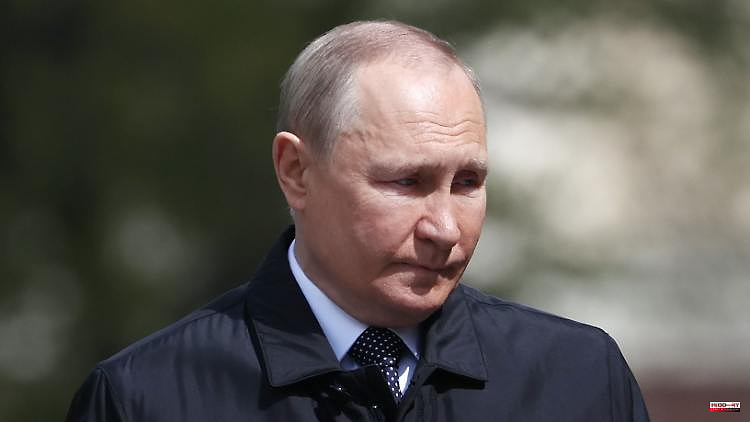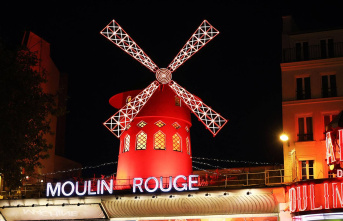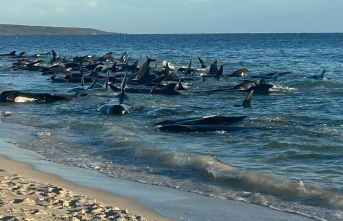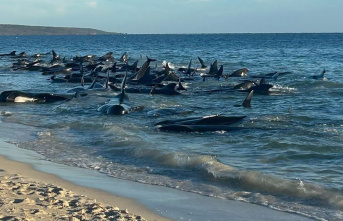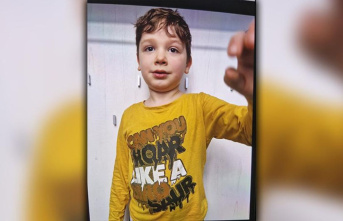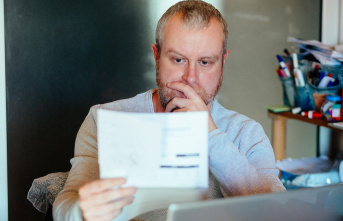For land access to Crimea, Russia has "forever buried the last remnants of its status as a great power," says the peace and conflict researcher Nicole Deitelhoff. "I would say that's a pretty bad record." In an interview with ntv.de, she also explains how great the danger of a nuclear war is, whether it is true that wars are not ended militarily but through negotiations, and what to think of the federal government's plan to use the Bundeswehr with a special fund of 100 billion euros and a much higher defense budget.
ntv.de: Those who speak out against arms deliveries to Ukraine often do so out of a feeling of fear that the war could spread, that there could be a nuclear war, and this feeling is of course completely legitimate. How big do you rate the risk of this happening?
Nicole Deitelhoff: That is difficult to answer. If I now say that the risk is one percent, then that would be dubious. Let me put it this way: There is such a risk, but it is relatively small at the moment.
What are you up to?
We have evidence that gives us at least a little insight into whether Russia is preparing for a nuclear escalation. Secret services and researchers evaluate satellite data, for example, they check whether carrier systems for nuclear weapons are being moved. If a nuclear attack were imminent, we would expect delivery systems to be strategically placed in different locations on Russian territory so as not to lose them all in the event of a counterattack. We don't currently see any abnormalities, and that's a good sign. I also found Putin's speech on May 9th interesting: he didn't announce general mobilization, but said that a third world war had to be prevented.
Doesn't that make one dependent on Putin? Then we would have to act all the more cautiously, the wilder he turns up his rhetoric.
This is a maneuver that we are familiar with from him: he tries to intimidate the other side in order to prevent them from taking further action. That alone would not be enough for me. If it escalated rhetorically and we saw that the nuclear delivery systems were in motion, then I think we would have to act much more cautiously.
Would the risk be less if Germany didn't support Ukraine at all in order not to provoke Putin?
Of course, the immediate risk of a nuclear confrontation would then be lower. If nobody helped Ukraine, Russia would simply annihilate the country and would have no need to threaten with nuclear weapons. However, that would then significantly increase the risk for Germany in the long term.
Would restraint encourage Putin to attack the Baltics?
Putin has always made a distinction between NATO territory and non-NATO countries. He didn't reach for the Baltic States or Poland, he reached for Georgia, Moldova and Ukraine. He has tried to destabilize these states by taking territories from them. If he isn't stopped in Ukraine, Moldova is likely to be his next move, and Georgia would also be another candidate.
What do you think of the argument from Alice Schwarzer and Co.'s open letter that "justified resistance against an aggressor" is "at some point in an intolerable disproportion" to the human suffering of the Ukrainian civilian population?
There is a moral argument behind this. It reads: the more victims a certain action entails, the less it can be justified, even if it is intended to remedy an injustice. What this argument ignores is the suffering that inaction brings upon the Ukrainian people. Ending support for Ukraine would not necessarily, or even probably, mean less suffering for Ukrainian civilians, but could mean just as much suffering. We saw what happened in the Russian-occupied territories: rapes, expulsions, shootings.
Can you say what is more in Germany's interest: that Ukraine wins the war or that the war ends as quickly as possible?
It is in Germany's interest that the war ends as quickly as possible, and without defeating Ukraine.
What is the West's goal in this conflict anyway? That Ukraine will win or not lose?
If you ask me, I think it should be in the West's interest that Ukraine doesn't lose. When we focus on winning, we suggest that it's about weakening Russia to the point where it can't get back on its feet. I consider it dangerous to create this impression, because of course one cannot want Russia to find itself in a situation in which it has the impression that it has so little chance that only a liberation can help.
The West's goal should be that Russia fails to impose its war goals, that Russia returns to the negotiating table, and that Ukraine is restored to its February borders. This should be communicated clearly, also to Ukraine. When the Ukrainian foreign minister says that Ukraine now has the confidence to win this war, that's dangerous. This can create a situation in which the war escalates.
Perhaps Kuleba's rhetoric serves the purpose of making it clear to Russia that ceding Crimea and the "people's republics" in Donbass would be a big concession for Ukraine in negotiations?
That certainly plays a role. You can also read this as a hint: Don't underestimate us, things could get much worse for you. Such rhetoric, uttered, for example, by US Secretary of Defense Lloyd Austin at Ramstein, can also be seductive.
You mean his sentence: "Ukraine clearly believes that it can win, and so does everyone else here."
The West is trying to change the balance in this conflict with its arms deliveries in order to enable Ukraine to reach a negotiated peace. I am also convinced that this is correct. But we have to keep an eye on how this affects the dynamics of this conflict, the behavior of both parties to the conflict.
What do you think of the federal government's Ukraine policy?
I think the federal government is acting very carefully. I would have liked to see faster and more decisive action. But at the same time one has to acknowledge that the federal government has sought to close ranks with its partners and that it is responsible for painful decisions. It is always emphasized that the turning point was a big step for the Greens. I think the SPD has a lot more historical ballast to deal with. And you have to remember that the federal government consists of three very different parties. So I'm quite impressed by how united this coalition is and sticking to its strategic goals.
Is it true, what one hears more often now, that wars are not ended militarily but through negotiations?
That's not true, wars are also ended militarily. There are wars that end with the complete surrender of an opponent, there are the classic campaigns of conquest that end with the attacker taking over the opponent's territory. There are no negotiations, there is submission at the end. However, most military conflicts do not end in complete surrender, but end because the conflicting parties can no longer afford to continue the conflict and because they have given up hope of being able to decide the conflict on the battlefield. Then there are negotiations. However, there are negotiations that end the immediate war and still do not bring peace - at least no peace that means more than the absence of systematic violence. Real peace is a process that takes time.
There is a notion that Putin needs a "face-saving solution" to get out of the war - what might that look like?
This is mostly a commonplace. Of course, it is easier to end a conflict in the long term if everyone can take something from the pitch. This is also known from private conflicts: If you are able to concede something to the other side - no matter how wrong it is - it is much easier to end a conflict. The only question is: what could that be? I believe that only Putin himself will be able to determine that. And he is currently working on presenting this as a victory: securing Luhansk and Donetsk, territorial gains in Donbass, maybe the land connection between Donbass and Crimea, although I find it difficult to imagine that Ukraine would concede that in negotiations. Looking at the balance of power "on the ground", this is not apparent at the moment.
Wouldn't every concession beyond Crimea, Donetsk and Luhansk signal that a state need only be unscrupulous enough to profit from an incursion into a neighboring country?
This is a decision that the parties to the conflict must make together, and it can only be clarified in negotiations between Ukraine and Russia. Ultimately, Putin and Russia have already lost so much of their future through this war that they are, so to speak, the eternal losers. I can hardly imagine that China - because your question is about China - will think that what Russia is doing is worth emulating. For land access to Crimea, Russia has buried the last remnants of its status as a great power forever. I'd say that's a pretty lousy record.
In your opinion, is the freedom of the rest of Europe being defended in Ukraine, as is sometimes said?
The way we understand this conflict makes it a conflict about the freedom of Europe. From the point of view of many European governments and from the point of view of NATO, Russia's actions are destroying the European security architecture and thus also fundamental values and principles such as the territorial integrity of states, the obligation to settle disputes peacefully and the promotion of democracy and human rights. In this sense, the war that Russia is waging against Ukraine is also a war against the freedom of Europe.
What do you think of the federal government's plan to better equip the Bundeswehr with a special fund of 100 billion euros and a much higher defense budget in the long term?
I am a member of the Advisory Board for Internal Management of the Federal Ministry of Defence. It's not so much about security and strategy as it is about the citizen in uniform. But working in this body gives me a good insight into how poorly equipped the Bundeswehr is in some cases and how difficult it is to even recruit soldiers with such equipment. I see a blatant disparity there. We cannot expect our own citizens to defend our security and our freedom unless we properly equip them. Even as a peace and conflict researcher, I cannot support something like that. Therefore, I am convinced that massive investments in the equipment of the Bundeswehr are actually required. There is an investment backlog that is no longer acceptable. Am I of the opinion that a special fund should therefore be anchored in the constitution? no But it is clear to me why the coalition is doing this. Because it's a way to circumvent the debt brake. It's a trick that I don't find very elegant and that I wish people would reconsider. However, large and targeted investments are still needed in the Bundeswehr. We are just getting into a new form of a future Cold War and will need increased defense budgets for the next few years. That could stay with us for a while.
Hubertus Volmer spoke to Nicole Deitelhoff
6

